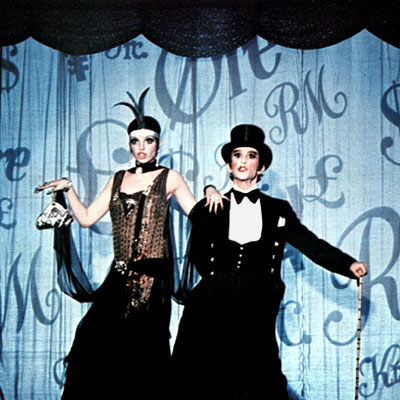Cabaret
Cabaret is probably one of the last musicals you would expect me to class as a cult film. After all, many other musicals have the stuff of obsession and depth that has carried them onwards into quirk and weirdom. After all, a critical success that scooped up eight Oscars in 1973, it’s hard for me to sit here and be like “boom, cult.” But cult isn’t just about quirk and surrealism, it can be about mainstream successes having a little bit more pulp than the rest. Cabaret is no Rocky Horror Picture Show but nor is it Moulin Rouge. If you look beneath the jazz hands, you’ll find a tale of decadence and despair.

In 1931, Berlin, Brian Roberts, a reserved British writer (as we all are here in Blighty,) moves to the town, hoping to earn money teaching English. When he moves into Sally Bowles’ (an American entertainer at The Kit Kat Club) boarding house, the two become unlikely friends and soon, unlikely lovers. Introducing him to a bohemian world underneath the increasing Nazi strong hold of Berlin, Sally and Brian have their relationship, sexuality and ultimate future put to the test as a reign of terror sweeps through their decadent culture.
I’m going to sit here and tell you the obvious now; Cabaret is a great musical. Directed a now musical movement, Bob Fosse, it is teeming with rhythm and song. Based on a 1966 Broadway musical by Kander and Ebb which was based on a 1945 The Berlin Stories by Christopher Isherwood (which is based on a crayon drawing he found…((not true)) Cabaret has grown ,developed, adapted and evolved. Liza Minnelli is mind blowing as Sally Bowles and uses all the talent in her lungs to blow us away in song but all her other talent to act passion and depth. Michael York as Brian is just as superb and their chaotic relationship strangely enough does not become a “cabaret.” It is instead woven between secrets, lies and sexual curiosity. Joel Grey as Emcee is outstandingly off beat as he narrates our characters moments in outrageous and truthful performances.
And the songs are bloody brilliant too.
But enough about the obvious; Cabaret stands out for on so many over levels. It’s hard to pick just one of the sub plots that take the movie into a timeless and outstanding piece of cinema. While the plight of Ms Sally Bowles and Mr Brian Roberts is a sad tale, it is still set against the backdrop of a Nazi uprising. Not has a song being so chilling as the moment a whole German village sing mindlessly to “Tomorrow Belongs To Me;” a fictitious Nazi youth song. It reminds us all about the fast increase to power the Nazi party have. There is the sub plot about two Jewish lovers, wishing to get married. This is all beautiful counteracted by the camp outrageousness of the Kit Kat Club and timed with excellence about the horrors that lay in wait for a musical friends.
Now, the original Broadway ending is much darker than the film as our many of the musical revivals. After all, in most they, in large detail, remind us all what happened to those lovers of jazz and vice. Hitler had proclaimed Berlin a city of sin and therefore aimed to purge of his perceived scum. Of course, the film does not show the graphic ending that the stage shows do but that is what makes it more chilling. The final pan over the audience reflected in the mirrored wall, silent after a Farewell song, shows the Nazi’s swimming in the crowd. And the beat of a cymbal crash as we all know that inevitable end to decadence. And the end, to Cabaret.
TTFN
Cookie
![]()
